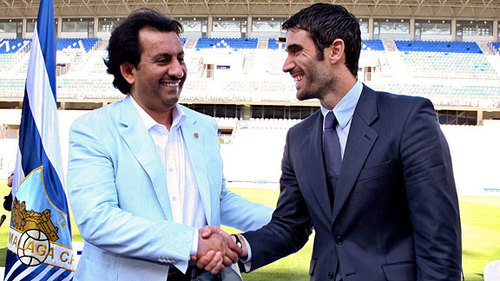
” Sold to you Mr Al-Thani for the princely sum of €36 million ”
The Spanish media has little to add to the Guardian report that so categorically stated Santi Cazorla’s arrival at the Emirates was a done deal. The basic thrust of the report was Cazorla’s personal terms had been worked out and now it was left to Malaga to accept Arsenal’s €20m offer. At this point, with RVP’s potential departure and Theo Walcott’s contract negotiations stalling, anyone with a pulse is bound to be linked to Arsenal.
The Guardian unlike the Daily Mail or Goal.com is taken seriously when it reports on player transfers. In Sid Lowe, they have one of the most trusted voices on the ground when it someone to anything Spanish football. There is obvious heft to a Cazorla link and it has not been pulled out of thin air.
However, Arsene Wenger was quick to dismiss a Cazorla arrival.
He said: “No [we are not close]. Maybe we will sign a Malaysian player!”
The background: A club like Malaga is being propped up by the Qatari royal family’s largesse just like PSG, except the Liga team is in far more serious economic trouble having fallen back in its previous wage commitments and transfer fees owed to other clubs. According to Lowe, the Al Thani’s could wipe the slate clean with a single huge tranche of cash but are footdragging for no good reasons. If that installment comes through, it would mean they will not have to sell players. Which is why Cazorla’s transfer even comes up. But Spain’s economy is teeter tottering on the precipice and there might be all sorts of questions raised with a potential conflict of interest between the ownerships of Malaga and PSG, with the possibility of meeting up in the Champions League.
To refresh one’s memory, PSG is owned by the Qatar Investment Authority, and their CEO is the Qatari PM, Sheikh Hamad bin Jassim bin Jaber bin Muhammad Al Thani. QIA is a sovereign wealth fund but the entity does not publish its holdings making it virtually impossible to gauge personal contributions from the Qatari royal family. CF Malaga’s owner is Sheikh Abdullah bin Nasser bin Abdullah Al Ahmed Al Thani, part of the royal clan, and related to the PM through bloodlines.
Sheikh Abdullah acquired Malaga in June 2010 for €36m, and in similar fashion to PSG though on a much smaller scale, the club made multi million dollar purchases to augment their squad under Manuel Pellegrini. The club most commonly associated with Brit expats in the sunny climes of the Costa Del Sol transformed within two years to the upper echelons of the Liga with players like Salomon Rondon, Santi Cazorla, Joris Mathijsen, and Julio Baptista. Last season they came fourth thus qualifying for the CL elimination stages for the first time in their history.
PSG, now in the news for making a rival bid of €40m for Luka Modric has already spent over €100m to bring in Ezekiel Lavezzi, Zlatan Ibrahimovic, Thiago Silva, and the new Andrea Pirlo, Marco Veratti, to their club. Carlo Ancelotti thus faces the same pressure on him as Roberto Mancini, to win PSG’s first Ligue title since 1993-94 and more importantly thrust PSG into the CL spotlight by becoming serious challengers to the usual suspects. Malaga’s introduction to the CL could become a future inevitability given the fluid nature of the Liga below Real and Barca. With the rest of the Liga in lockdown over transfers, the acquisition of a few quality players could make all the difference.
We could see additional scrutiny over the ownership firewall between these two clubs as they increase their chances of international meetings and competition for transfers. A huge factor in Qatar’s investment in these two clubs is a unquenchable desire for national branding, to establish the tiny Emirate as a world sporting power and to develop a league that matches the world’s best all in time for the 2022 World Cup and beyond. There are different ways to do this and Qatar has already made some leeway through a more controversial grassroots approach and bending rigid citizenship requirements to lure star athletes in time for the Olympics and other international competitions.
At the same time, an imploding Spanish economy does not bode well for such an exposure as players in rival clubs face shrinking wages, non-payments, or outright sales. It will throw up in sharp relief the economic disparities between traditional powerhouses like Valencia and Sevilla now struggling to keep up with the new kids on the block propped up by outside money. Qatar’s successful 2022 World Cup bid has been tainted with accusations of kickbacks and vote rigging.
The Emirate is probably in the midst of a delicate dance between malignant associations with its wealth and where it engenders goodwill. Qatar’s bottomline is not financial investment in these clubs, the amounts represents spare change to the wealthiest nation in the world. Thus, moving on Malaga at the cost of upsetting the rest of the Liga or opening up fresh scrutiny into how they do business is detrimental to their actual desired outcome. These considerations affect players like Cazorla. He may well be on his way to Arsenal if this theory holds up. Lets keep our fingers crossed.
2 comments on “Cazorla, Spain economy, and PSG and Malaga conflict of interest”





money is ruining soccer
money is ruining soccer
facebook.com/ml.football